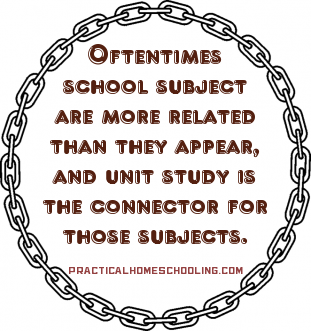 As a young girl, my father took our family on month long trips across the United States. Since we traveled with 400 National Geographics in the back seat of our station wagon, these trips were both fun and educational.
As a young girl, my father took our family on month long trips across the United States. Since we traveled with 400 National Geographics in the back seat of our station wagon, these trips were both fun and educational.
Somehow, on these treks across America, my father showed me the "connectedness" of the world. Monticello wasn't just about the man Thomas Jefferson. Monticello embodied architecture in the buildings, botany in the gardens, history in Jefferson's political achievements, and a world view of how men should be treated in the written words of the Declaration of Independence.
I wanted to impart this same "connectedness" of the world to my children when I began homeschooling, so I chose unit studies as the "connector" of subjects. Under unit themes, subjects fit together, giving them meaning. If "trust" is the theme, our focus is on sheep trusting their shepherd for their every need. Children memorize the 23rd Psalm (Bible), examine similes, metaphors and analogies in the 23rd Psalm (English), study the habits and traits of sheep (science), research the actual responsibilities and duties of a shepherd (history), read the Newbery Award winner . . . and now Miguel which is the story of a shepherd boy's life (literature), and lastly, card, spin and weave sheep's wool (art). Units provide a multitude of topics connected by a theme.
The unit study method of home education has fringe benefits that go beyond teaching the "connectedness" of things. My children retain information and facts, because factual data hangs together in nice tidy packages. But the greatest bonus from doing units is the sense of learning, reading and doing together as a family. There is a sense of family connectedness in addition to the factual connectedness.
Academics are important, but relationships are even more important. Units help build those treasured relationships between family members that last a lifetime. This is what my father gave me, and this is what I now give my children.